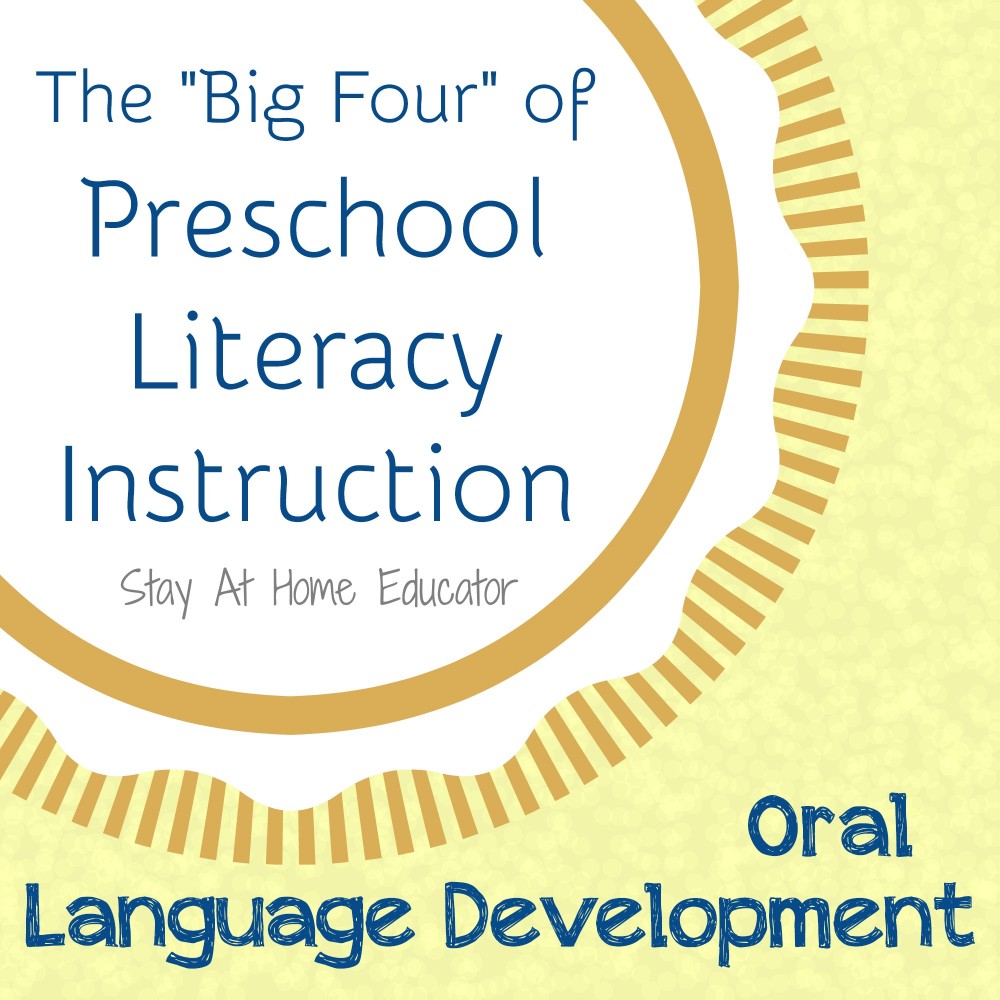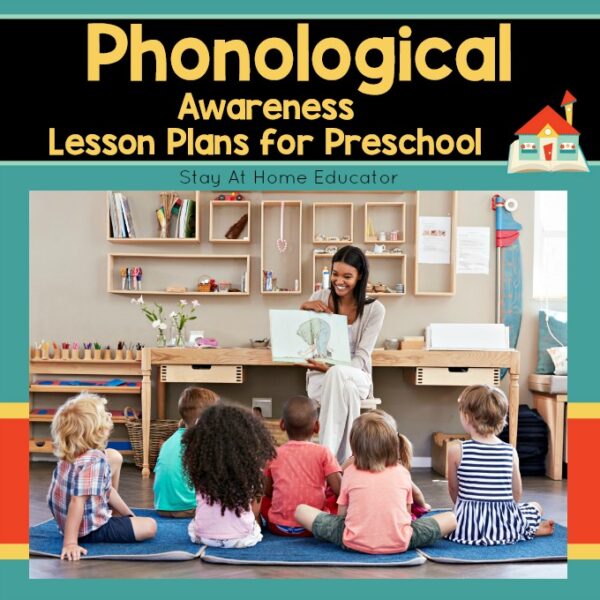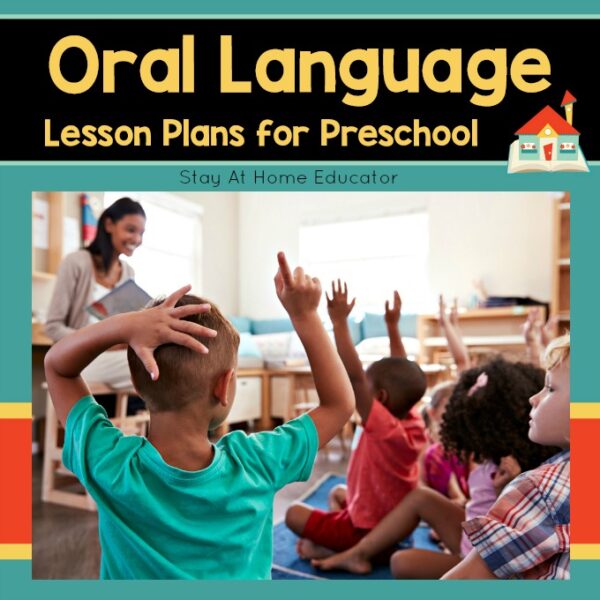The importance of oral language development and language skills in the school day is undeniable. From socializing to participating in the classroom, oral language skills are at the center of the preschool learning environment. And it’s just one component of “The Big Four” of preschool literacy instruction.
This post will teach you everything you need to know about oral language development during the preschool years. From what it is and the stages of development to activities that develop language skills in the classroom, this post will be like a crash course in all things language related.
What You Need to Know About Oral Language Development
Unlike mathematics or science, reading is the only academic area in which we expect children to arrive as kindergarteners with a basic skill level.
Research has shown that oral language—the foundations of which are developed during the early learning years—has a critical impact on children’s readiness for kindergarten as well as their reading success throughout their academic career.
And it’s not just about listening and speaking, but also about written language.
Related
What is Oral Language Development?
Very simply defined, oral language is the acquisition of vocabulary that aids in meaningful speech and conversation.
It is the system of spoken words through which we express ideas, needs, knowledge, and feelings.
However, oral language development consists of much more than simply vocabulary. It also includes:
- phonology – the organization of sounds within an alphabetic language
- grammar or syntax – the rules that govern the structure of speech and writing
- morphology – a subset of semantics which considers the smallest units of meaning within a word, as well as how the word is formed
- pragmatics – the understanding of how language is used in social situations
- discourse – the act of communicating, in oral or written form
We will go through each of those five areas of skill acquisition in depth later in this post.
Why is oral language development important to early literacy?
Proficiency in oral language provides children with tools for thought.
Without fluency in speech, children find it difficult to learn and interact with the environment around them. Like other emergent reading skills, oral language development is a strong indicator of later reading success.
Children with a persistent problem learning language known as Developmental Language Disorder (DLD), are at an increased risk of poorer academic and social performance.
Source
Children who enter formal schooling with large and vast vocabularies are better prepared to learn how to read, as well as better prepared to learn through reading and being read to. Children who have strong oral language skills tend to be strong readers and writers, and that trend follows them throughout grade school.
Language skill acquisition begins at a young age, before students begin focusing on print-based concepts such as sound-symbol correspondence and decoding. Because these skills are often developed during the first few years if life, children with limited oral language ability are typically at a distinct disadvantage by the time they enter kindergarten. (source)
How are Oral Language Skills Developed?
Almost all children learn the rules of their language at an early age through use, and over time, without formal instruction. This suggests that during the early childhood, child’s ability to develop language is primarily based on genetics and their environment.
The environment is a significant factor because children learn the specific variety of language (dialect) that the important people around them speak.
Children do not, however, learn only by imitating those around them.
We know that children work through linguistic rules on their own because they use forms that adults never use, such as “I aren’t” instead of “I’m not” or “I see your feets.” Children eventually learn the conventional forms, am not and feet, as they sort out for themselves the exceptions to the rules of English syntax.
Like other developmental skills in early childhood, learning to talk is a process that requires time and practice in everyday situations. Constant correction of a child’s speech is usually unproductive, however modeling proper speech is.
Developmental Milestones in Language Acquisition
When children develop specific skills is sometimes hard to pinpoint, and children develop skills in a range of months if not years. In general…
- Children say their first words between 12 and 18 months of age.
- They begin to use complex sentences by the age of 4 to 4 1/2 years.
- By the time they start kindergarten, children know most of the fundamentals of their language, so that they are able to converse easily with someone who speaks as they do (that is, in their dialect).
If you are ever concerned about your child’s speech and language development, ask your pediatrician for a referral for a speech screening by a specialist. This is often done through your state’s Health and Welfare Department.
The Components of Oral Language Development
To help children develop skills in oral language, we must first understand the components that make up oral language and how they have an impact on a child’s academic success.
There are five components of oral language development.
Phonologoy
Phonology is the study of sounds within a language. This includes not only how they’re produced, but also their distinctive features and mutations that make one sound different from another in an understandable way for someone else to recognize.
Children begin to develop phonological awareness after a basic phonological system has been established. This is when children begin to develop awareness for words in sentences or syllable sin words. Other phonological awareness skills include:
- rhyming
- syllabication
- onset and rime
- isolating sounds
- blending sounds
- manipulating sounds
Semantics (Vocabulary)
Vocabulary development includes both on expressive and receptive vocabulary.
Expressive vocabulary are words that children actively use to communicate via talking and writing. Receptive vocabulary represents words that children understand. Receptive vocabulary is built from personal experience and environment, but not necessarily from writing or speaking.
Morphology
Morphology deals with the knowledge of the smallest unit of meaning within a word. Some experts consider morphology to be a subset of syntax, which we describe below.
A good example of how morphology impacts oral language development is follows:
The word “horses” has five phonemes – /h/, /or/, /s/, /e/, /z/. However, the word only had two morphemes, or units of meaning: horse the animal and the “s” that means there is ore than one horse.
Morphological awareness is also related to children’s reading success, and should, therefore, be targeted alongside phonological awareness in interventions for early literacy. (Source)
Syntax
Syntax is sometimes referred to as grammar. More specifically, syntax is the set of rules that dictates the ways in which words and phrases can be combined into language. It is essential to use correct syntax in order to communicate messages that are meaningful and easy to understand.
Syntax influences the way children communicate via spoken language from an early age. Once children enter formal schooling and begin learning how to write, syntax move from being a basic language skill, and plays an even more important role in language development.
In fact, syntax has been shown to be a predictor of writing success, which in turn impacts success in higher education and employment later in life. (Source)
Pragmatics
Finally, pragmatics refers to the use of language in social situations. This includes the following social norms:
- listening to others
- responding to a spoken message
- taking turns in a conversation
- interacting in a larger group discussion
- maintaining personal space while speaking with others
Researchers have found that children who struggle with pragmatics in oral language development tend to have underdeveloped literacy skills due to the difficulty they experience in socially participating in class. (Source)
How can oral language development be nurtured?
Parents, caregivers, and teachers play an active role in oral language development. Providing children with an environment rich in language will help develop oral language skills.
This begins with adults actively listening to children in their care, answering their questions, and teaching children how to listen and respond to oral communication. Teaching reading comprehension skills are important, too, since language and literacy skills go hand in hand. One of the most valuable things parents, caregivers, and teachers can do to develop oral language skills to build the child’s background knowledge of various topics.
Tips for Encouraging Language Development in Preschool
In addition, the following are some ways in which parents, caregivers and teachers can nurture language development.
- Have meaningful and genuine conversations with your child or students.
- Model speaking kindly and respectfully.
- Ask open-ended questions.
- Encourage your child or students to explain what they are thinking or feeling and offer words/vocabulary when needed.
- Comment on ideas and objects in your child’s or students’ environment to encourage oral engagement.
- Read to your child or students, frequently and at length, every day, and encourage a response to reading.
- Sing, chant, and recite rhymes and finger plays.
- Teach your child or students how to take turns and how to respond (on-topic) during a conversation.
- Encourage question asking.
- Model thinking aloud, for example, “I wonder what would happen if…”
- Use new vocabulary when speaking with your child or students and encourage them to use new words.
- Read aloud young reader chapter books to your child or students.
Simply put…speak, listen, and read to your child – consistently and frequently and at length – to help develop oral language skills.
Daily Lessons in Oral Language Curriculum
Of course, having a systematic oral language curriculum is particularly helpful.
Preschoolers are at an advantage when they are taught the wide range of skills in these oral language lesson plans. From following one-step directions and participating in a discussion to interpreting songs and poems and using descriptive words, your preschooler will gain a strong foundation in listening and speaking.
These lesson plans feature 40 complete weeks of daily lessons in oral language through the use of nursery rhymes, finger plays, and games.
What are some books that can help develop preschool oral language skills?
Here are some of our favorite picture books related to building oral language skills. I recommend these books because of lyrical text that is vocabulary rich, or because of the rich and dynamic stories they tell. Yet, these books are still of high interest to young children.
Wordless Picture Books Can Develop Oral Language Skills, Too.
It’s true. Wordless pictures books are a powerful resource for developing children’s language skills because the child gets to tell the story by looking at the pictures.
Here are some of our favorite wordless picture books. They were carefully selected for their interesting illustrations that can build vocabulary and compel children to ask questions.

I’m Sarah, an educator turned stay-at-home-mama of five! I’m the owner and creator of Stay At Home Educator, a website about intentional teaching and purposeful learning in the early childhood years. I’ve taught a range of levels, from preschool to college and a little bit of everything in between. Right now my focus is teaching my children and running a preschool from my home. Credentials include: Bachelors in Art, Masters in Curriculum and Instruction.




[…] THE “BIG FOUR” OF PRESCHOOL LITERACY INSTRUCTION: ORAL LANGUAGE DEVELOPMENT […]